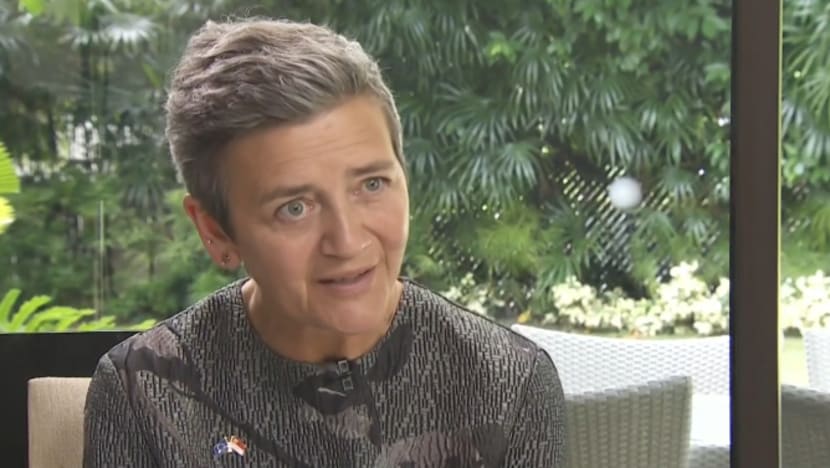‘Not a blockade’: EU competition chief defends tariffs on Chinese EVs
European Commissioner for Competition Margrethe Vestager tells CNA’s Loke Wei Sue the duties are not there to eliminate the competitive edge of Chinese EV makers, but to level the playing field for homegrown manufacturers.

European Commissioner for Competition Margrethe Vestager speaks to CNA during an interview.

This audio is generated by an AI tool.
SINGAPORE: Tariffs imposed on imports of electric vehicles made in China are justified, fair and necessary for a global industry, the European Union’s antitrust chief said on Friday (Jul 5).
European Commissioner for Competition Margrethe Vestager told CNA the duties are not in place to eliminate the competitive edge of Chinese EV makers against their European counterparts.
Instead, the tariffs “will correct what we consider to be unfair”, and give local manufacturers a level playing field, she explained.
“It's necessary because it's important for a global EV industry that is not just China providing for the entire world,” she said.
Vestager added it is “fully appropriate and justified” to use tariffs within the confines of international rules.
“With these tariffs, there will still be imports of EVs from China to Europe. This is not a blockade. There is still global trade ongoing,” she said.
CHINESE EVs SLAPPED WITH TARIFFS
The 27-member bloc on Friday raised duties to up to 37.6 per cent, as Brussels acts to protect member states’ motor industry.
They are on top of the EU's standard 10 per cent duty on car imports.
EU officials say Chinese state subsidies are giving companies an unfair advantage in the competition, which allows EVs made in China to be sold at much lower prices compared with those produced in Europe.
Tariffs were determined based on estimates of how much state aid each EV maker received, and their level of cooperation with EU investigators.
“For some companies (with) close cooperation – they've been very willing to open their books – (will find) lower brackets of tariffs imposed. For the non-cooperative businesses, (that’s where) the higher bracket of tariffs is,” Vestager said.
Cooperative firms – including western carmakers Tesla and BMW – will face duties of 20.8 per cent while those seen as non-cooperative will be slapped with the higher 37.6 per cent.
BEIJING VOWS RETALIATION
The tariffs are provisional and pending a final decision in four months' time as talks from both sides continue.
Vestager said communication is a crucial part of negotiations, with German Vice-Chancellor Robert Habeck visiting Beijing two weeks ago to soothe tensions.
China has threatened wide-ranging retaliation over the tariffs. Since January, Beijing has opened tit-for-tat probes into numerous European imports, including brandy and pork.
Even as tensions ratchet up, China's commerce ministry said it is still hoping to reach a consensus on the EV levies with the EU through dialogue.
With the tariffs, EV makers will have to decide whether to absorb the cost or raise prices.
There are concerns that more expensive electric vehicles will put European consumers off and pose a roadblock to the grouping’s goal of becoming carbon-neutral by 2050.
However, EU officials have said that while cheap Chinese goods can contribute to Europe’s environmental goals in the short-term, it could be detrimental to the bloc’s industries in the medium-to-long term, as local firms that find it impossible to compete could go bust.
MORE PROBES INTO CHINESE IMPORTS
The tariffs come on the back of a series of EU probes into Chinese imports, including tinplate steel, wood flooring, medical devices, wind turbines and solar panels.
Vestager said it is the same Chinese playbook that led to the tariffs.
“(About) 15 years ago, European (solar) businesses were invited to China. There was a technology transfer. There were subsidies for production to be set up in China. Slowly but surely, import to China was closed off,” she said.
She added that solar exports from China then flooded the European market at attractive prices due to the subsidies and low wages.
As a result, only about 3 per cent of solar panels installed in the past year in Europe were produced in the bloc, she said.
While tariffs are “not a silver bullet”, EU regulations for fair conditions will ensure European businesses can continue to compete equally.
Under the Foreign Subsidies Regulation, companies must notify and get approval if a non-EU government provides financial contributions to a business that could give it an unfair advantage against the bloc's homegrown firms.
Vestager added that while European nations are not free from subsidies, they are controlled so they do not unlevel the playing field.















